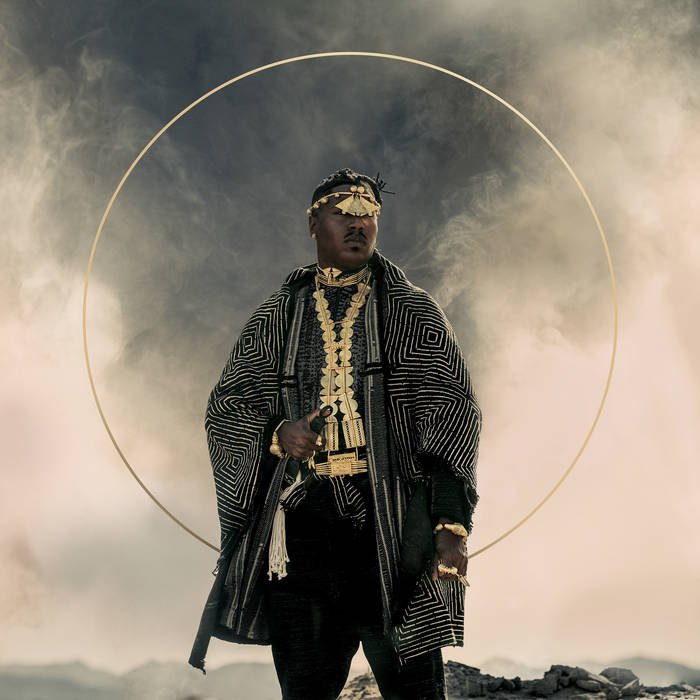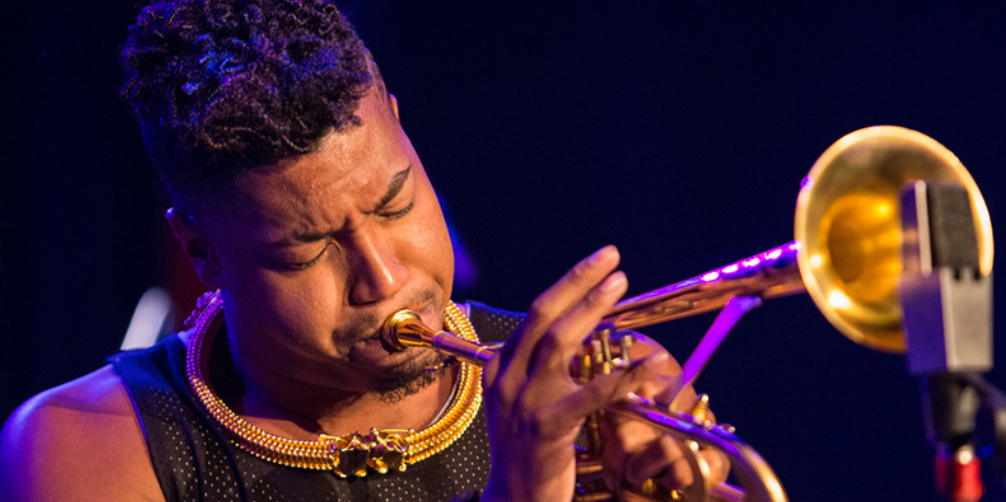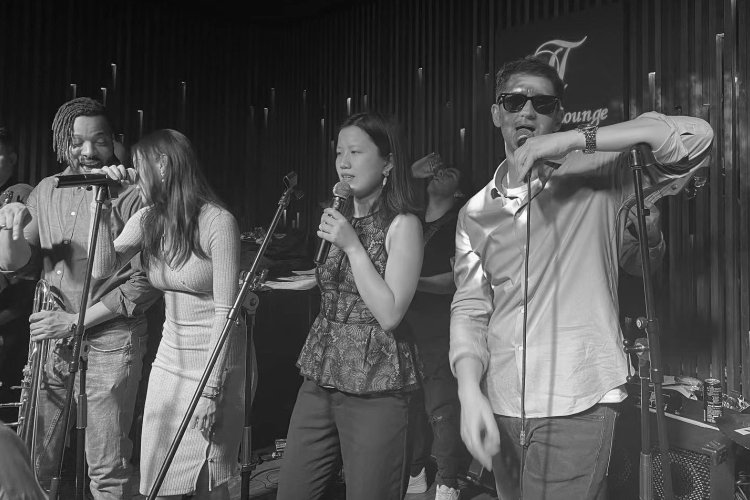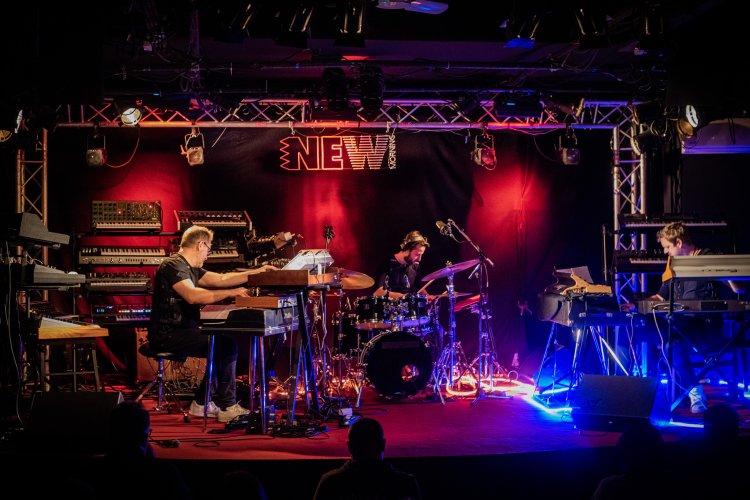Christian Scott Atunde Adjuah: “I’m Putting My Life Force Into This Sound”
Ever since the first trumpet was bent into existence, innovators like Dizzy Gillespie and Miles Davis – and contemporary composers like Ambrose Akinmusire and Yazz Ahmed – have each shaped the horn to fit their own bold jazz interpretations.
Defining jazz today is more futile than ever. Its recent flirtations with hip-hop, soul, and electronic music have developed a more globally inclusive sound beyond jazz’s traditional confines. This is what Christian Scott aTunde Adjuah calls “stretch music,” a pursuit that challenges the elasticity of structure and improvisation.
“I don’t call the music that I make jazz,” the 36-year-old Grammy nominee told the Beijinger this week on the phone from Los Angeles. “The older words that we used to describe the music don’t really fit anymore.”
Over nine albums, aTunde Adjuah has sidestepped convention by traversing eras and genres, often within the same song. Born in jazz’s native land of New Orleans, he picked up the trumpet at age 11 and landed his first lessons with his saxophonist uncle, Donald Harrison Jr.
“When he asked me to improvise, the feeling that I got scared the shit out of me,” aTunde Adjuah admits. “I immediately could feel that what he was doing and what I was listening to was the closest thing to being a Jedi.”
With his latest record, Ancestral Recall, aTunde Adjuah honors his jazz roots while confronting social themes over a startling fusion of international rhythms, rock, and neo-soul. The self-proclaimed “sonic architect” kicks off his 15-date tour Jun 8 and 9, at Blue Note Beijing.
You’ve toured Asia before. How does your music resonate with audiences here versus those back home in the US?
Usually, when I come to Asia, in China or Japan, they’re very respectful of what it is that we’re doing. How they show their appreciation is very different. It’s not going to be uproarious applause; typically they wait until the performance is over to show their appreciation. I really like playing in Asia for that reason; they’re not interrupting your playing with applause.
But are they pulling out the phones too often?
Sometimes the phone can inhibit your reading of what’s going on. Now you’ve put a device between you and I when I’m trying to communicate to you, right? You’ve automatically created a barrier. There’s a difference between hearing something and listening to it. It’s not like I have a negative feeling about it, it’s just not a preference of mine.
Jazz especially fascinates people in Beijing, because it only arrived here about 25 years ago.
I didn’t know that. That actually makes me excited to sort of be on the front end of the relationship between jazz and Beijing. It’s a needed music. It’s a form that’s born out of something that all human beings navigate, and it’s also a form that has a high nutritional value.
You mean, like food?
Even in terms of how I teach young composers, the things that they’re overeating in their musical diet can create barriers in their ability to be able to effectively communicate what they’re going through and what emotively is going on. You have to make sure that your diet is the right thing so that you’re connecting to people and honestly communicating your experiences. They’ll get it, because it’s actually sincere. That’s really where the priority has to lie for me.
How does a trumpet player absorb the world around them, then interpret those events and express it all through notes?
How somebody like [pianist] McCoy Tyner is going to do that is very different than how Thom Yorke from Radiohead is going to do that. Their acumen are different, their compositional approaches are different. The folks that are the best at doing it from where I sit are usually the ones that allow their personal experiences inform how they react musically.
In a year, three of the men in my family – my grandfather, my stepfather, my great-uncle, men that I had great relationships with – they all died. Loss had never really been a part of my playing even though I grew up in an environment that was pretty rough. I can now hear loss in my playing, and that is now a part of how I communicate. Them not being around is going to affect the way that I speak.
There’s the speaking, and there’s the breathing. How conscious are you of the breathing process? That’s the most organic part, isn’t it?
Yeah, very conscious. Absolutely. I work out four days a week, most weeks with an altitude mask that restricts the air-flow; you can set it from 3,000 to 12,000 feet above sea level, just to make sure that my lung capacity is doing what I need it to do to effectively communicate. I have my own line of B-flat horns. They’re built to help me communicate better based on the needs of this time period, musically. And breathing is incredibly important in that. When I’m breathing into an instrument, I’m putting my life force into this sound. So you’re spot-on, it’s very important.
I’ll invite people to jazz shows, and some say they don’t understand jazz. How do you define it?
It’s funny. I don’t call the music that I make jazz. And I think as a cultural through-line in this moment, most people refer to what we’re doing as stretch music. It’s definitely a derivative of jazz; we’re still creating and improvising. Just because it is inherently jazz doesn’t make it exclusively that. So to me it seems like everyone is fighting to unify under one understanding and one larger language. This is the natural byproduct of what actually happened on this planet. So this is why when you listen to someone like Thundercat or Flying Lotus, it’s very difficult to discern specifically what their one influence culturally is. Everyone is listening to so many things because our diet is calibrated differently.
The older words that we used to describe the music don’t really fit anymore. I learned as a little boy that jazz and blues are synonyms for each other. And my teachers would always say that blues is a human being’s most sincere attempt to try and communicate what they’re going through to another person. And they would say jazz is just blues that learned to speak our languages. In New Orleans, the place where the music is actually from, jazz was to constantly seek new terrain, to constantly look for new ways of approaching communicating. So it’s really difficult to say what it is and what it isn’t, because I can stop 100 Americans and ask them and all of them have completely contrasting ideas about what it is. The music will speak for itself. More often than not, we get the reaction where people will say, “I hate jazz, but I love what you’re doing.” It’s not that they hate the music, it’s just that their exposure to it hasn’t happened. Culturally, someone said that this music is supposed to be for rocket scientists, and therefore if you are not a Fulbright scholar then you don’t get to enjoy this music.

Are you hard on yourself when it comes to composing?
I’ve had moments of that. When I was at Berklee [College of Music], I made rules for myself. I had to write two compositions a day or I couldn’t shut down that day, I couldn’t go to sleep until I’d finished that work. Five days a week for the entire time that I was at Berklee. The songs, the compositions had rules. That’s something that I developed because I started going on the road in high school with McCoy Tyner and my Uncle Donald’s band, different bands from New Orleans. And one of the things that I noticed was that whenever they had to make a record, they were always stressed out because they didn’t have the time to actually sit down and write the songs out, and to try to figure out what they wanted to do with the arrangement. So it dawned on me that it was going to be a necessity to channel what it was that I was feeling and execute those things in a short period of time, so that I wouldn’t have the same holes in my acumen that I saw from some of my predecessors. So it was important for me to develop the ability to write a song the same way I can write a letter. So if I was limited on time and resources, I could still get my job done. That was something that I did when I was in college, but every composer and really good bandleader I’ve been with, there’s different things that I took from them. When I was with Prince, one of the things that I learned from him was he had the ability to play all the instruments. So before he was going to write something out for you and articulate for you what you needed to be doing, he was very clear about being natural. He was gonna test those things out before he wrote them out to you. That’s how a bandleader is completely different than, like, Eddie Palmieri, who is a master at arranging. He doesn’t necessarily have to play through it because he knows which range for the trombone is going to make sense. It depends on what I’m composing and why I’m composing.
What else are you drawn to musically for inspiration?
I’m gonna make you laugh, because that reality doesn’t really exist for me so much. I can’t think of a moment where I wasn’t composing since I was 12. So something is always being worked on. We just put out Ancestral Recall, and the last month has really been me just resting and trying to get centered. Last year we put out three records; the touring was nonstop. And so I’ve been off basically this month just trying to get things together.
Yesterday I was like, let me review some of the stuff that I’ve been working on. I had all these sessions open on my computer. And I went through it and there were 12 nearly completed songs that are great. And a few of them I forgot about. Within the month’s time of me sitting down I’ve already composed more than enough material for another record. For me, as someone that is serious about the language of music, I’m trying to unify people under one understanding. As a sonic architect, I need to understand how to do that as well. To me, what’s important is understanding how to get the appropriate reaction based on the subject matter and the merit of the song from the audience. That’s the fun part for me. I learned as a very young person there’s fun in being serious. You can catch me in a moment where I might be listening to Édouard Lalo’s “Cello Concerto in D minor,” and the next moment I might be listening to a Young Jeezy record. And then turning around from that I’m listening to an old out-of-print record by Freddie Hubbard. So the range of influences is wide.
When did it hit you that this was what you needed to do for the rest of your life?
I was about 11 years old, maybe 12. Probably two weeks after having a horn, once I had my first lesson with my Uncle Donald. When you’re a kid and you’re clapping rhythms and my mom is helping me to sight-read passages, that experience was very different than the level of fright that I felt when I was three inches from him when my uncle opened the instrument up.
When he played he started to improvise and I could feel his horn vibrating. I don’t know how else to explain it. He was playing all of these flurries of notes. I could hear how the chords were moving; that’s how clearly he was improvising. So I immediately could feel that what he was doing and what I was listening to was the closest thing to being a Jedi. As a kid, I’m into Star Wars. Having that kind of power, having the ability to really communicate something, it was clear to me that that was what I had to do because it was the most difficult thing that I had ever seen anyone do. It frightened me. When he asked me to improvise, the feeling that I got scared the shit out of me. I wasn’t going to allow that feeling to exist very long. Maybe on some level it’s my ego, but there was a part of me that was like, “I’m gonna get this.” I just really fell in love with my Uncle Donald, and by way of that I fell in love with the music.
Christian Scott aTunde Adjuah will perform at Blue Note on Jun 8 at 7.30 and 10.00pm, and Jun 9 at 6.30pm. Tickets start at RMB 300. For more information click here.
Need something more? Check out this week's extensive list of gigs over at Noise Pollution
Images: Berklee, Bandcamp







